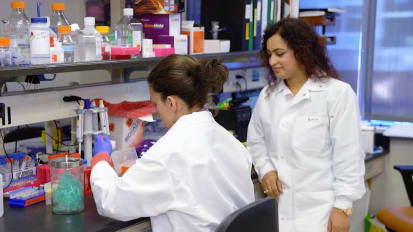Saima Riazuddin, PhD

Dr. Riazuddin’s team is focused on understanding the molecular and genetic basis of hearing impairment. This is done by ascertaining large human families segregating hearing loss and through genetic screening; disease causing mutations are identified in these families. The identified mutations are further studied by analyzing the orthologous mutant mouse models, which are evaluated for developmental, structural and physiological defects of the inner ear. This will help us better understand the mutated genes and the underlying molecular mechanism of the hearing process. Identification of such genes will help in early and more accurate diagnosis for certain forms of hereditary hear impairments. The lab uses various approaches ranging from genetic analysis of human DNA samples to screen and identify the candidate genes, to molecular biological approaches to determine the expression of gene under study at protein /RNA level. To further study the target genes different model systems are exploited which include but are not limited to mouse, Zebrafish etc, where expression, localization and morphology of the inner ear is compared to wild type controls.
Pub Med Articles: https://www.ncbi.nlm.nih.gov/pubmed/?term=Saima+Riazuddin%5BAuthor%5D
Related Videos
 Video
Video
The cEAR Lab: Translational Research, Transforming Care for Hearing and Balance Disorders
Patients suffering from hearing/balance loss can be referred to the University of Maryland Department of Otorhinolaryngology to determine the predisposing genetic factors for their hearing/balance loss.
